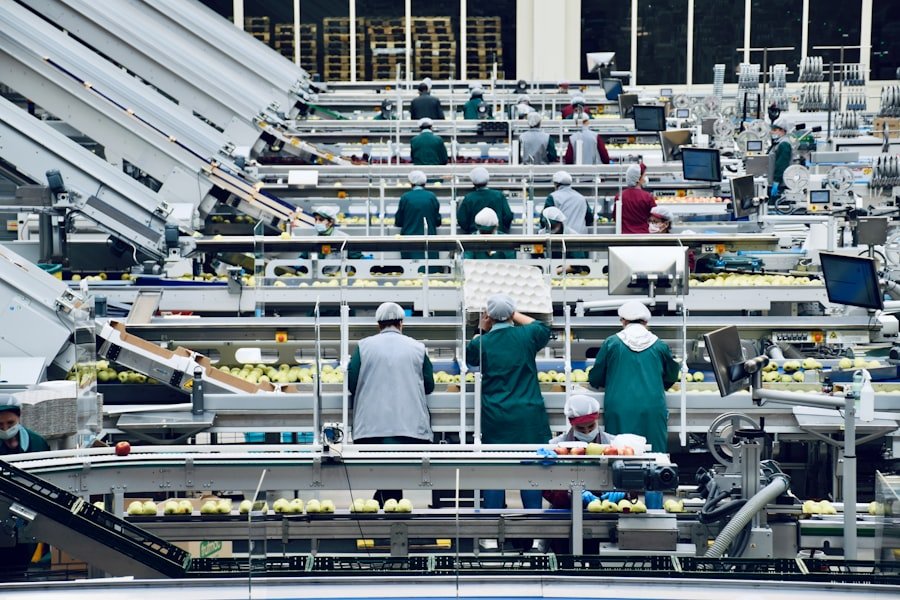Technological disruption is a phenomenon characterized by rapid and significant changes in various industries due to the introduction of new technologies. This process can fundamentally alter business operations, presenting both challenges and opportunities for established industries. As technology advances, businesses face constant pressure to adapt and innovate to maintain their competitive edge.
The rise of digitalization, automation, artificial intelligence, and other technological advancements has triggered widespread disruption across multiple sectors, including manufacturing, retail, finance, healthcare, and transportation. Consequently, traditional industries are compelled to reassess their business models, processes, and strategies to survive and thrive in this new technological landscape. The effects of technological disruption extend beyond businesses, impacting consumers and the broader economy.
It has the potential to revolutionize product and service delivery, enhance efficiency and productivity, and create new avenues for growth and development. However, it also presents significant challenges for traditional industries as they struggle to keep pace with technological changes and adapt to evolving market demands. This article will examine the impact of technological disruption on traditional industries, exploring the challenges they face, opportunities for innovation, strategies for adaptation, case studies of successful transitions, and future outlook.
Additionally, it will provide recommendations for navigating the dynamic landscape of technological disruption.
Key Takeaways
- Technological disruption is reshaping traditional industries by introducing new ways of doing business and challenging established norms.
- Traditional industries are experiencing significant impacts from technological disruption, including changes in consumer behavior, market dynamics, and competitive landscape.
- Challenges faced by traditional industries include adapting to new technologies, retraining the workforce, and navigating regulatory and legal hurdles.
- Technological disruption presents opportunities for innovation, such as developing new products and services, improving operational efficiency, and reaching new markets.
- Strategies for adaptation to technological disruption include investing in research and development, fostering a culture of innovation, and forming strategic partnerships with technology companies.
Impact on Traditional Industries
Job Displacement and Economic Challenges
One of the key impacts is the displacement of traditional labor by automation and artificial intelligence. This has led to job losses in many industries, particularly in manufacturing and retail, as machines and algorithms take over repetitive and routine tasks. While this may lead to increased efficiency and cost savings for businesses, it also creates social and economic challenges, such as unemployment and income inequality.
Changing Consumer Behavior and Expectations
Technological disruption has also changed consumer behavior and expectations. With the rise of e-commerce, for example, traditional brick-and-mortar retailers are facing intense competition from online platforms. Consumers now have access to a wider range of products and services at their fingertips, leading to a shift in shopping habits and preferences. This has forced traditional retailers to invest in their online presence and omnichannel strategies in order to stay competitive.
New Business Models and Disruptors
Additionally, technological disruption has also led to the rise of new business models and disruptors that challenge traditional industry incumbents. Companies like Uber and Airbnb have revolutionized the transportation and hospitality industries, respectively, by leveraging technology to create new platforms for service delivery. In conclusion, the impact of technological disruption on traditional industries is multifaceted, affecting labor markets, consumer behavior, and industry dynamics. It is crucial for traditional industries to understand these impacts in order to effectively navigate the challenges and opportunities brought about by technological disruption.
Challenges Faced by Traditional Industries

Traditional industries face a myriad of challenges in the face of technological disruption. One of the primary challenges is the need to invest in new technologies and infrastructure in order to remain competitive. This requires significant capital investment and resources, which can be particularly challenging for small and medium-sized enterprises with limited budgets.
Additionally, traditional industries often struggle with legacy systems and processes that are not easily adaptable to new technologies. This can hinder their ability to innovate and transform their operations in response to technological disruption. Another challenge is the need to reskill and upskill the workforce in order to meet the demands of a rapidly changing labor market.
As automation and artificial intelligence continue to replace traditional jobs, there is a growing need for workers with digital skills and technical expertise. Traditional industries must invest in training programs and education initiatives to ensure that their employees are equipped with the necessary skills to thrive in a technology-driven economy. Furthermore, traditional industries also face challenges in terms of regulatory compliance and cybersecurity.
As technology becomes increasingly integrated into business operations, companies must navigate complex regulatory frameworks and protect themselves from cyber threats in order to safeguard their operations and data. In summary, traditional industries face numerous challenges in adapting to technological disruption, including the need for investment in new technologies, overcoming legacy systems, reskilling the workforce, and navigating regulatory and cybersecurity concerns.
Opportunities for Innovation
Despite the challenges posed by technological disruption, traditional industries also have numerous opportunities for innovation and growth. One of the key opportunities is the ability to leverage technology to improve efficiency and productivity. By embracing automation, data analytics, and artificial intelligence, traditional industries can streamline their operations, reduce costs, and enhance their overall performance.
This can lead to improved customer experiences, faster time-to-market, and greater competitiveness in the market. Additionally, technological disruption also presents opportunities for traditional industries to diversify their product offerings and explore new markets. For example, traditional manufacturers can use 3D printing technology to create customized products or enter new niche markets that were previously inaccessible.
Similarly, traditional retailers can use data analytics and machine learning to personalize their marketing efforts and offer targeted promotions to customers. Furthermore, technological disruption also opens up opportunities for collaboration and partnerships with startups and tech companies. By embracing open innovation models, traditional industries can tap into external expertise and resources to drive innovation within their organizations.
In conclusion, technological disruption presents numerous opportunities for traditional industries to innovate and grow by leveraging technology to improve efficiency, diversify product offerings, and collaborate with external partners.
Strategies for Adaptation
In order to adapt to technological disruption, traditional industries must develop comprehensive strategies that address the challenges they face while capitalizing on the opportunities for innovation. One key strategy is to invest in digital transformation initiatives that enable companies to modernize their operations and embrace new technologies. This may involve upgrading legacy systems, implementing cloud-based solutions, or adopting new digital tools that enhance productivity and efficiency.
Additionally, companies should prioritize reskilling and upskilling their workforce in order to ensure that employees have the necessary digital skills to thrive in a technology-driven environment. Another important strategy is to foster a culture of innovation within the organization. This involves creating an environment that encourages experimentation, risk-taking, and continuous learning.
Companies should establish innovation labs or incubators that allow employees to explore new ideas and technologies that can drive business growth. Furthermore, traditional industries should also consider forming strategic partnerships with startups, tech companies, or research institutions in order to access external expertise and resources that can fuel innovation within their organizations. In summary, developing comprehensive strategies for digital transformation, fostering a culture of innovation, and forming strategic partnerships are essential for traditional industries to adapt to technological disruption.
Case Studies of Successful Adaptation

Several traditional industries have successfully adapted to technological disruption by embracing innovation and transforming their operations. One notable example is General Electric (GE), a multinational conglomerate that has leveraged digital technologies to drive its industrial operations. GE has invested heavily in industrial internet of things (IIoT) technologies that enable it to collect and analyze data from its industrial equipment in real-time.
This has allowed GE to optimize its operations, improve maintenance processes, and offer predictive maintenance services to its customers. By embracing digital transformation, GE has been able to enhance its competitiveness in the industrial sector while creating new revenue streams through data-driven services. Another case study is that of Nike, a global leader in the sportswear industry that has embraced digital innovation to transform its business model.
Nike has invested in digital platforms and e-commerce capabilities that enable it to engage directly with consumers and offer personalized products and experiences. Through its NikePlus membership program and digital apps, Nike has been able to build a direct-to-consumer relationship that bypasses traditional retail channels. This has allowed Nike to capture valuable consumer data and insights while creating new revenue streams through digital sales channels.
In conclusion, these case studies demonstrate how traditional industries can successfully adapt to technological disruption by embracing digital transformation and leveraging technology to drive innovation within their organizations.
Future Outlook and Recommendations
Looking ahead, it is clear that technological disruption will continue to shape the landscape of traditional industries in the years to come. In order to navigate this ever-changing environment, traditional industries must remain agile and proactive in their approach to innovation and adaptation. One key recommendation is for companies to prioritize investment in digital capabilities that enable them to modernize their operations and embrace new technologies.
This may involve partnering with technology providers or investing in internal R&D initiatives that drive digital transformation. Furthermore, companies should also focus on building a culture of innovation that encourages creativity, experimentation, and collaboration across all levels of the organization. By fostering an environment that values continuous learning and adaptation, companies can better position themselves to respond to technological disruption and drive sustainable growth in the long term.
In conclusion, while technological disruption presents significant challenges for traditional industries, it also offers numerous opportunities for innovation and growth. By developing comprehensive strategies for adaptation, fostering a culture of innovation, and embracing digital transformation initiatives, traditional industries can successfully navigate the complexities of technological disruption while positioning themselves for long-term success in a rapidly evolving market landscape.
If you’re interested in learning more about the impact of technological disruption on traditional industries, you may want to check out the article “The Rise of the Gig Economy and Its Impact on Traditional Employment” on The Econosphere. This article explores how the gig economy, fueled by technological advancements, is reshaping the traditional employment landscape and the implications it has for various industries.
FAQs
What is technological disruption?
Technological disruption refers to the way in which new technologies and innovations can significantly alter or replace existing products, services, or business models within an industry.
What are the effects of technological disruption on traditional industries?
Technological disruption can lead to significant changes within traditional industries, including the potential for job displacement, shifts in consumer behavior, changes in market dynamics, and the need for companies to adapt or risk becoming obsolete.
How do traditional industries respond to technological disruption?
Traditional industries may respond to technological disruption by investing in research and development, adopting new technologies, retraining employees, seeking partnerships with tech companies, or diversifying their product or service offerings.
What are some examples of traditional industries that have been disrupted by technology?
Examples of traditional industries disrupted by technology include retail (e.g., e-commerce), transportation (e.g., ride-sharing), hospitality (e.g., online booking platforms), and media (e.g., digital streaming services).
What are the potential benefits of technological disruption for traditional industries?
While technological disruption can pose challenges for traditional industries, it can also lead to increased efficiency, improved customer experiences, new business opportunities, and the potential for industry growth and innovation.








